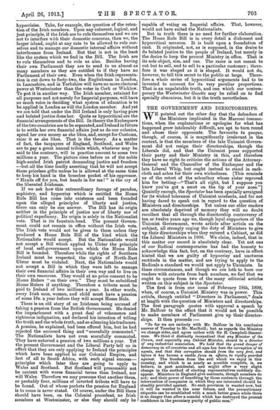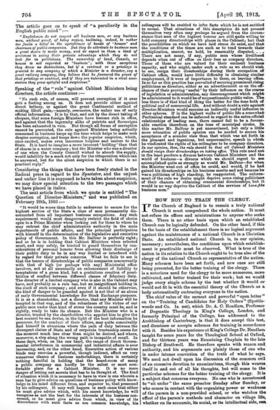THE GOVERNMENT AND DIRECTORSHIPS.
The first is from our issue of February 18th, 1899, when, of course, a Unionist Ministry was in power. This article, though entitled "Directors in Parliament," deals at length with the question of Ministers and directorships. The first paragraph quotes with approval a speech by Mr. Balfour to the effect that it would not be possible to make members of Parliament give up their director- ships. It then proceeds :— "So far we are entirely with Mr. Balfour in his conclusive answer of Tuesday to Mr. MacNeill; but as regards the Ministry we change sides, and agree rather with Sir H. Campbell-Banner- man. We think it distinctly inezpedient that any Minister of the Crown, and especially any Cabinet Minister, should be a director of any industrial association. We hold that the grand danger of democracy in all countries and all ages has been the corruption of its agents, and that this corruption should from the very first, and before it has become a visible force in affairs, be rigidly guarded against. The freedom from the evil which we enjoy in this country, and which is as nearly as possible complete, is, we believe, in part accidental, and might after a very slight change in the method of electing representatives suddenly dis- appear. Ministers in England give contracts, though members do not; and their power of benefiting by those contracts through the intervention of companies in which they are interested should bo steadily provided against. No such provision is wanted now, but it will be wanted in the near future, and the precautionary etiquette can be established with a much better grace while there is no danger than after a scandal which has destroyed the present confidence in the pecuniary purity of public men." The article goes on to speak of "a peculiarity in the English public mind" :— " Englishmen do not suspect all business men, or any business men, without proof, of being rogues, inclining, indeed, to rather too facile a belief in the uprightness of heads of 'houses' and chairmen of public companies. But they do attribute to business men a great desire to make money, and do expect in them a kind of acuteness in seeing their private advantage which they do not look for in politicians. The ownership of land, Consols, or houses is not regarded as 'business' ; with those exceptions they draw no distinctions, but if a contract or a privilege is granted to any company of which a Minister is a director, say a great railway company, they believe that he favoured the grant of that privilege or contract, and if they are interested in. a rival asso- ciation they grow spiteful and suspicious."
Speaking of the " rule " against Cabinet Ministers being directors, the article continues :—
" No such rule, of course, will prevent corruption if it ever gets a footing among us. It does not provide either against direct bribery, or against the great Continental method of making illicit gain,—namely, concussion, the unfair use of early official information. It is by that, and not by the direct taking of cheques, that some foreign Ministers have become rich in office, and against that the ingenuity alike of patriots and Sovereigns has been exhausted in vain. But though all forms of corruption cannot be prevented, the rule against Ministers being actually concerned in business keeps up the tone which helps to make men despise corruption, and keeps down the popular suspicion, which, once excited, makes even innocence helpless and useless to the State. It is hard to imagine a more innocent 'holding' than that of shares in a water company ; but the Minister who was a director of one when the County Council wished to absorb the supply, would infallibly be a mark not only for the vituperation which can be answered, but for the silent suspicion to which there is no practical reply."
Considering the things that have been freely stated in the Radical press in regard to the Spectator, and the unjust and unfair line it is supposed to have taken about suspicion, we may draw special attention to the two passages which we have placed in italics.
The next article from which we quote is entitled "The Question of Director-Ministers," and was published on February 28th, 1903 :—
"It would be worse than futile to endeavour to secure for the highest service of the State a class of men permanently dis- connected from all important business occupations. Any such requirement would most dangerously restrict the field of choice open to a Prime Minister when looking out for those to whom he may entrust the chief administrative authority in the main departments of public affairs, and the principal participation with himself in the determination of the legislative and executive policy of Government. In this Mr. Balfour is perfectly right ; and so he is in holding that Cabinet Ministers when selected must, and may safely, be trusted to guard themselves by con- siderations of personal honour from allowing their discharge of their public duty to be in any way limited or interfered with by regard for their private concerns. What he fails to see is that the tenure of directorships of public companies concurrently with that of high (or perhaps with any) Ministerial office involves, not at all necessarily an enhancement of liability to temptations of a gross kind, but a gratuitous creation of possi- bilities of conflict between different classes of fiduciary duty. The director of a limited company who is also in the Cabinet may have, and probably as a rule has, but an insignificant holding in the stock of such company ; and even if it should be otherwise, the kind of danger to be guarded against is not that of an abuse of early Governmental knowledge for Stock Exchange purposes. It is as a shareholder, not a director, that any Minister will be tempted in that way, and of the robustness of the virtue of our public men under that kind of stress the country must be, and is rightly, ready to take its chance. But the Minister who is a director, trusted by the shareholders who appoint hint to give the best counsel he can devise, in the light of the best information he possesses. for the conduct of their affairs, may quite conceivably find himself in situations where the path of duty between the divergent claims of State and of corporate trusteeship seems for the moment much less clear than might be desired, and where, moreover, a step alona' the wrong path is incapable of recall. In these days, when, on the one hand, the range of direct Govern- mental interference in commercial and industrial affairs is ever increasing, and, on the other hand, Executive action of various kinds may exercise a powerful, though indirect, effect on very numerous classes of business undertakings, there is certainly nothing fanciful in holding that the board-room of many a public company can hardly be the safest or most com- fortable place for a Cabinet Minister. It is no mere danger of letting out secrets that has to be thought of. The kind of situation which it is necessary to have in view is one wherein a man has to give advice on questions of business policy with know- ledge in his mind different from, and superior to, that possessed by his colleagues. It may well happen in such eases that either he must give advice which, with his secret knowledge, he will recognize as not the best for the interests of the business con- cerned, or he must give advice from which, in view of its discordance -with such facts as are common knowledge, his colleagues will be enabled to infer facts which lie is not entitled to reveal. That situations of this description do not present themselves very often may perhaps be argued from the circum- stance that men of the highest honour are still quite willing to hold company directorships with places in the Cabinet; but that the possibilities on which we have laid stress do exist, and that the conditions of the times aro such as to tend towards their multiplication, cannot, we hold, be reasonably disputed. . . . There are not many, if any, public men whose livelihood depends when out of office on their fees as company directors. Those of them who are valued for their eminent business capacity, and who might, under such a rule as we should wish to see, resign their directorships during their occupation of Cabinet office, would have little difficulty in obtaining similar employment, if it were of importance to them, on leaving office. In so far as this practice has prevailed of securing prominent rising politicians as directors, either as an advertisement or on the off- chance of their proving 'useful' by their influence on the course of legislation or administration, any discouragement which might be administered to it would hoof unquestionable public value. The less there is of that kind of thing the better for the tone both of political and of commercial life. And without doubt a rule against director-Ministers would exercise an indirectly useful influence in other spheres. If in the highest walks of public life a somewhat Puritanical standard can be enforced in regard to the extra-official relationships of leading men, there cannot fail to be a favour- able reaction therefrom on the tone of municipal circles. In this matter Mr. Balfour is yet unconvinced, but only a little more education of public opinion can be needed to secure his acceptance of a sounder view than that which was set forth in the pleasant and ingenious, but unpersuasive, speech in which he vindicated the rights of his colleagues to be company directors. In our opinion, then, the rule should be that all Cabinet Ministers should resign their directorships on taking office. This rule need not in the least produce a divorce between Cabinet Ministers and the world of business—a divorce which we should regret to see accomplished quite as strongly as would Mr. Balfour—for when the Minister went out of office he could, and would, if be had gained his directorships on his business merits and not because he was a politician of high standing, be reappointed. The enforce- ment of the rule we desire might deprive some rising politicians of their chances of obtaining ornamental directorships, but it would in no way deprive the Cabinet of the services of tona-fida business men."



























































 Previous page
Previous page